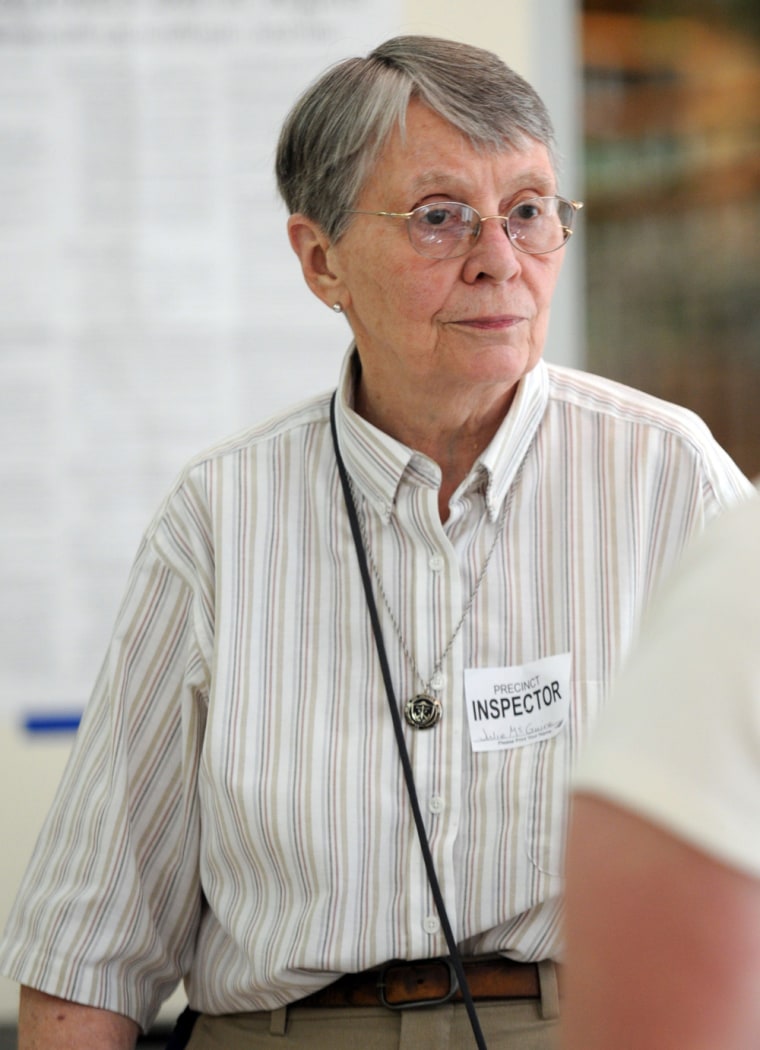About 12 Indiana nuns were turned away Tuesday from a polling place by a fellow sister because they didn't have state or federal identification bearing a photograph.
Sister Julie McGuire said she was forced to turn away her fellow members of Saint Mary's Convent in South Bend, across the street from the University of Notre Dame, because they had been told earlier that they would need such an ID to vote.
The nuns, all in their 80s or 90s, didn't get one but came to the precinct anyway.
"One came down this morning, and she was 98, and she said, 'I don't want to go do that,'" Sister McGuire said. Some showed up with outdated passports. None of them drives.
The convent will make "a very concerted effort" to get proper identification for the nuns in time for the general election. "We're going to take from now until November to get them out and get this done.
"You can't do this like school kids on a bus," she said. "I wish we could."
Late Tuesday, Secretary of State Todd Rokita was unapologetic.
"Indiana's Voter ID Law applies to everyone. From all accounts that we've heard, the sisters were aware of the photo ID requirements and chose not to follow them," he said in a statement released by his office.
Elsewhere across the pivotal state, voting appeared to run smoothly, despite the fears of some elections experts that the Supreme Court's recent refusal to strike down Indiana's controversial photo identification law could cause confusion at the polls.
Indiana's photo ID law is the strictest in the country. The Republican-led effort was designed to combat ballot fraud, said supporters, who also have acknowledged that no case involving someone impersonating a voter at the polls has ever been prosecuted in Indiana.
ACLU files lawsuit
The state's American Civil Liberties Union sued, calling the law a poll tax that disproportionately affected minorities and elderly voters, those most likely to lack such identification. On April 28, the Supreme Court ruled 6 to 3 that the law did not violate the Constitution.
In a primary expected to draw record numbers, a voter hot line set up by the secretary of state's office mostly received calls concerning precinct locations, spokeswoman Bethany Derringer said.
But a group of voting rights advocates that established a separate hot line reported receiving several calls from would-be voters who were turned away at precincts because they lacked state or federal identification bearing a photograph.
One newly married woman said she was told she couldn't vote because her driver's license name didn't match the one on her voter registration record, said Myrna Perez of the Brennan Center Justice at New York University's law school, coordinator of the 1-866-OUR-VOTE hot line. Another woman said she was turned away from casting her first-ever ballot because she had only a college-issued ID card and an out-of-state driver's license, Perez said.
"These laws are confusing. People don't know how they're supposed to be applied," she said.
Not the right kind of ID
According to the New Voters Project, sponsored by Student Public Interest Groups, about a dozen college students at Notre Dame, Butler University and Indiana University said they were told at the polls they didn't have the right form of identification.
Angela Hiss, a 19-year-old sophomore at Notre Dame, presented her Notre Dame ID card and her Illinois driver's license. Poll workers did not inform her that she could have cast a provisional ballot, she told project staff monitoring her polling place.
In some counties, polling locations ran short on ballots as voters flocked to Indiana's first meaningful presidential primary in 40 years. Indiana's largest, Marion County, had to print several thousand extra Democratic ballots because of increased demand in traditionally Republican voting areas, said Angie Nussmeyer, spokeswoman for the clerk's office.
"Primaries are very quiet, and I think the turnout we might see today probably rivals some of our general elections," she said.
In southern Jackson County, at least one precinct ran short of ballots and an electronic backup system failed. Poll workers made copies of ballots and planned to hand-count them, which was expected to delay results there.
Several precincts in northwestern Porter County, where Barack Obama was expected to do well, also ran out of Democratic ballots, and a judge ordered polls to stay open an additional hour.
Nancy Zondor of Chesterton said she went to vote at her Porter County polling site about 4 p.m. only to be told she would have to wait or come back for a Democratic ballot. She said she had to leave without voting to drive to her son's track meet.
"I was aggravated, for sure, it's a big election," said Zondor, who planned to vote for Obama. "I just always vote in every election and want to."
Since the Supreme Court decision last month, advocacy groups have fretted that people showing up to vote in Tuesday's primary would not understand their rights, which include being able to cast a provisional ballot and obtain a proper ID within 10 days so that ballot would be counted later.
Sean Greene, of the nonpartisan electionline.org, was monitoring precincts in the Lafayette area of Tippecanoe County. "It's going pretty well," he said, despite long lines. "Most of the people I've seen today are prepared and used to this. They have their IDs out already."
That thought was echoed in South Bend, where Elizabeth Bridges, 63, said half of the people working in her voting precinct were family members, but still she showed her ID.
"I think the law is a good thing because a lot of people are crooked," she said.
